This is a debate I'm having with me, myself, and I.
Feel free to join in!
I was considering one of Troels designs and thought of the following pros and cons.
For approximately the same cost and one of Troels mid-level designs I could purchase a very
nice set of previously enjoyed ProACs. The positive on the ProACs side is designs with a long
history of proven success and if I tire of them I would get most of my investment back in the resale price.
On the plus side for Troels his DIY reputation is exemplary. The downside is that if I tire of his speaker
the resale prices for DIY speakers in this neck of the woods is poor. I'd consider myself extremely lucky if
I got 50% of what I spent.
All that said I am a DIYer at my core and I'm inclined to roll the dice of one of Troels designs.
Nothing ventured, nothing gained? I'm intrigued by the experience alone.
Regards,
Dan
Feel free to join in!
I was considering one of Troels designs and thought of the following pros and cons.
For approximately the same cost and one of Troels mid-level designs I could purchase a very
nice set of previously enjoyed ProACs. The positive on the ProACs side is designs with a long
history of proven success and if I tire of them I would get most of my investment back in the resale price.
On the plus side for Troels his DIY reputation is exemplary. The downside is that if I tire of his speaker
the resale prices for DIY speakers in this neck of the woods is poor. I'd consider myself extremely lucky if
I got 50% of what I spent.
All that said I am a DIYer at my core and I'm inclined to roll the dice of one of Troels designs.
Nothing ventured, nothing gained? I'm intrigued by the experience alone.
Regards,
Dan
Sure, selling a complete DIY loudspeaker may not be easy. However, you could sell the drivers and maybe some of the xover parts for 50% of what you payed. That said, I'd recommend you to get what you really want (be it ProAc or Troels or something else) so you will keep it and don't need to sell again.
With diy (kit building counts as diy in my book) you can have features like bitumen damping, bracing, chamfered driver cutouts, sheep wool damping, fancy binding posts and internal wiring of your choice, boutique crossover components, multiplex cabinets and various finishes at a fraction of the cost of a comparable commercial design.
Drivers can be reused or sold, same goes for crossover parts.
Drivers can be reused or sold, same goes for crossover parts.
DIY also allows to attend to every tiny detail. I'd think there are very few manufacturers that can match that level of obsession. And if there are, I probably wouldn't want to afford it.
Attachments
-
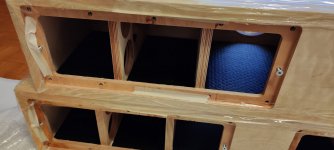 IMG_20211204_183437.jpg218.2 KB · Views: 712
IMG_20211204_183437.jpg218.2 KB · Views: 712 -
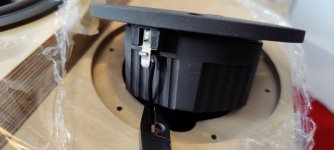 IMG_20211212_111709.jpg203.8 KB · Views: 530
IMG_20211212_111709.jpg203.8 KB · Views: 530 -
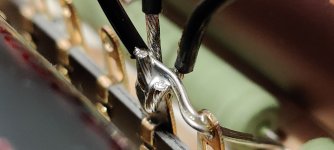 IMG_20211211_202204.jpg191.3 KB · Views: 523
IMG_20211211_202204.jpg191.3 KB · Views: 523 -
 IMG_20211212_105427.jpg109 KB · Views: 524
IMG_20211212_105427.jpg109 KB · Views: 524 -
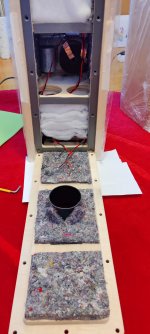 IMG_20211212_080802.jpg286.4 KB · Views: 526
IMG_20211212_080802.jpg286.4 KB · Views: 526 -
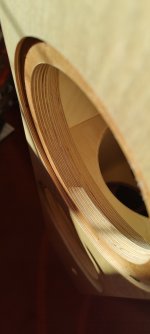 IMG_20211203_145308.jpg189.1 KB · Views: 532
IMG_20211203_145308.jpg189.1 KB · Views: 532 -
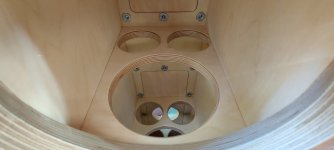 IMG_20211203_145453.jpg163.2 KB · Views: 522
IMG_20211203_145453.jpg163.2 KB · Views: 522 -
 IMG_20211208_183357.jpg270.6 KB · Views: 553
IMG_20211208_183357.jpg270.6 KB · Views: 553 -
 IMG_20211211_182557.jpg308.1 KB · Views: 709
IMG_20211211_182557.jpg308.1 KB · Views: 709 -
 IMG_20211212_144330__01.jpg355.5 KB · Views: 731
IMG_20211212_144330__01.jpg355.5 KB · Views: 731
Two sides to the coin. Buying a finished product is a lot less work and less stressful. DIY has a great deal of satisfaction when something you built works!
In some cases DIY is far more cost effective. For example, a DIY Pass Labs F5 is cheaper than the real one. Also, I bought a line array kit from Selah Audio.
I could've never afforded a completed set of line arrays.
Regards,
Dan 😉
In some cases DIY is far more cost effective. For example, a DIY Pass Labs F5 is cheaper than the real one. Also, I bought a line array kit from Selah Audio.
I could've never afforded a completed set of line arrays.
Regards,
Dan 😉
If you're confident you can see the project from start to finish and the finish will have some resemblance of a speaker buy the kit. Since you don't have any preferences or reference points as to what the thing should sound like as long as it kind of works then have some fun and go with your DIY heart. And since you're DIY at heart even if Troels design will not sound exemplary to you you will be able to shape it it your liking . You will re-design crossover , change box and make it yours . Easy .
I think which kit and which Proac is a factor, and remember, one doesn't have to go with the "level 1" kit options.
One plus on my side. I have all the necessary tools, skills, and experience to successfully complete any kit.
You can get a gently used ProAC D20R for approximately $3000USD ProAC D20R
And I'm fond of Troels CNO-25-mkII (level 1) for around $3500USD CNO-25
Regards,
Dan
You can get a gently used ProAC D20R for approximately $3000USD ProAC D20R
And I'm fond of Troels CNO-25-mkII (level 1) for around $3500USD CNO-25
Regards,
Dan
Go for diy. Diy is not about saving money. Satisfaction of making something yourself which gives you long term pleasure of music listening can not be calculated in $. Plus you learn something. If you just want to buy and sell, join audiogon.
Go for woodworking. It will save you some money if you will stick with it . If not you will loose (and learn on your failures ). Troels has no vision of his own. Most of his designs are influenced by commercial offerings . He does everything , higher efficiency , medium efficiency , vintage and low efficiency and whatever driver cat will drop on his doorstep. I only really like $50 speakers but notoriously shoot myself in the foot buying used $5000 speakers for $600 thinking it will be the one...
Troels kits are good speakers, but too complex and expensive (as he uses fancy Jantzen parts in his crossovers, that are often to complex) but they do sound very good and are very balanced. On resale value no diy will sell for big money i think. So if that is important, buy the proac. But on sound the troels is great, just too expensive i think.
I would never build a kit if I hadn't heard it before. I've owned a large list of well regarded speakers and none of them were perfect, and some were terrible. The quite expensive Dynaudio Contour 1.3se and Audience 52 were my least favourite by far, but strangely, one of my favourites was the budget JPW AP2.
Even building your own carries risks - I spent quite a lot of time and money on a recent build, and it didn't work out well at all. The drivers didn't measure as I thought they would, and I will be lucky to get a fraction of what I paid for them 🙁 It's quite frustrating, but I treat it as a learning experience and move on.
Even building your own carries risks - I spent quite a lot of time and money on a recent build, and it didn't work out well at all. The drivers didn't measure as I thought they would, and I will be lucky to get a fraction of what I paid for them 🙁 It's quite frustrating, but I treat it as a learning experience and move on.
Don't limit yourself to TG designs. While he obviously has a good reputation, he doesn't show he's following the modern developments in loudspeaker design: he doesn't publish off-axis measurements or sound power analysis. And my eyes tell me his designs more often than not neglect the importance of directivity. He seems to be lagging some 10 years or more in design development. Go (also) for designers who are more clear about modern design. At least pick designs with published off-axis response plots. Read e.g. the OSMC document for a better understanding.
The OSMC docs are here: https://github.com/mbrennwa/osmcdoc/blob/master/osmc_paper.pdf
Also take a look at the off axis stuff in the references cited in the document.
Also take a look at the off axis stuff in the references cited in the document.
On the plus side for Troels his DIY reputation is exemplary.
No it is not considered exemplary by all speaker DIY folk. He is something of a "subjectivist" and a hobbyist in the sense of swiftly trying all sorts of things that catch his interest to see how they turn out. As a DIYer gains technical knowledge and understanding their view of many of his designs is likely to shift towards too much money allocated to expensive drivers and crossover components for the overall performance achieved. He also builds his speakers in particular ways that aren't always that well aligned with the technical optimum. Nonetheless his designs are always competent which cannot be said of all DIY speaker designers even some of the more popular ones. His designs can probably be viewed as a safe option for those new to the hobby but they aren't necessarily going to be optimum in terms of technical performance for the money.
Agreed. Besides, for the fraction of that cost, similar or better diy speaker designes are avalable. Free plans.
Just an example:
http://speakerdesignworks.com/index.html
Just an example:
http://speakerdesignworks.com/index.html
- Home
- Loudspeakers
- Multi-Way
- To Troels or not to Troels?